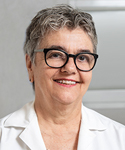“Literacy can possibly be changed in the future with major public health initiatives focused on disadvantaged populations,” Dr. Singh said. But he added that addressing such factors as health literacy, communication and changing patient views on treatment in the pursuit of better outcomes for all populations, including disadvantaged groups, may be easier.
Implications for Surgery
Susan Goodman, MD, professor of clinical medicine at Weill Cornell Medicine, New York, noted studies of trends have found white patients are three times more likely than Black patients to undergo a total hip arthroplasty and twice as likely to undergo total knee arthroplasty, despite knee OA being more common in Black people than white people. Little difference in this trend exists when data from 1991 are compared with that from 2008, she noted.7
“What’s particularly disheartening is there’s been no change in those numbers over time,” she said.
Dr. Goodman pointed out how the choices Black patients tend to make for their OA treatment are very different from those of white patients. Black patients are more likely to try alternative medications and take Tylenol, and less likely to have an arthroplasty procedure.8 They’re more likely to experience complications, and worse outcomes tend to track with poverty, according to an analysis of U.S. Census data.9
“The patients who are avoiding these knee replacements may actually have a very good rationale,” she said, and that is “another problem we have is understanding this and understanding what the problems really are. There is a significant overlap of race and ethnicity with socioeconomic variables—and that increases the difficulties of understanding racial disparities in care.”
The differences extend to RA. Black patients are more likely to use complementary or alternative therapy for RA—and less likely to receive biologics despite “a clear benefit to standard therapy,” Dr. Goodman said. Early, intensive treatment may actually reduce the demand for joint replacement surgery and improve outcomes overall.10
On top of all this, Blacks are under-represented in randomized clinical trials in RA, which may mean differences in benefits or responses to medications are not captured, Dr. Goodman said.11
Although some of these problems may seem difficult to tackle, one area for improvement is the knowledge gap—“not understanding what arthroplasty entails, not understanding what the benefits are and not understanding what the hospital experience is,” Dr. Goodman said. “So I think that may be one of the easier opportunities for improving access and outcomes.”




